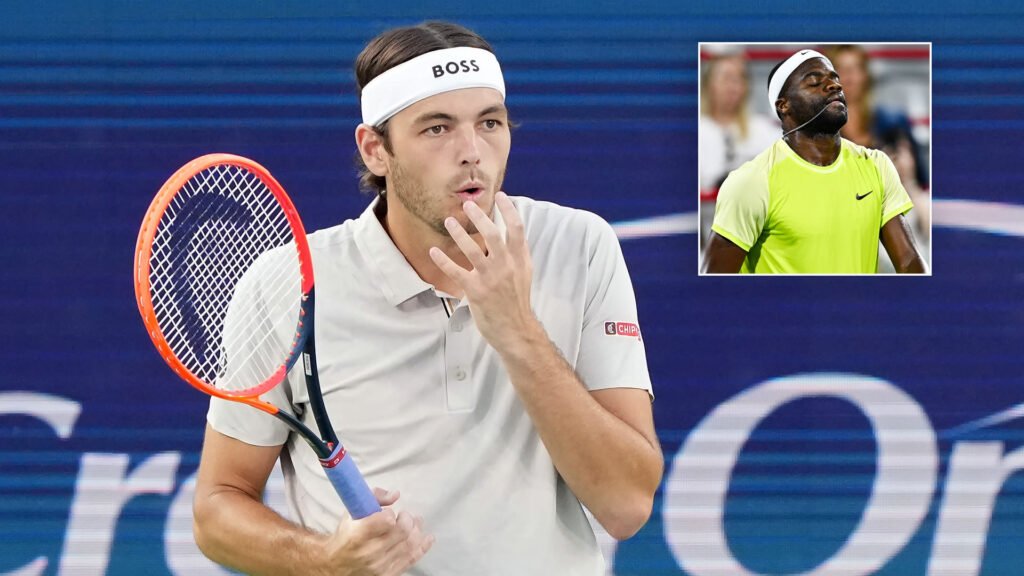The ATP Tour has changed several important rules in response to player concerns raised by a string of contentious electronic line-calling blunders during the hard-court swing in North America.
Players vented their outrage on social media when Taylor Fritz and Frances Tiafoe were both denied a point for comparable “ridiculous” Hawkeye system breakdowns.
Following many high-profile instances of electronic line-calling during the hard-court swing in North America, the ATP Tour has expeditiously updated its officiating procedures, allowing “common sense” to win out. The modification was made in response to players’ outcry at the Cincinnati Open and last week’s Omnium Banque Open in Montreal over similar Hawkeye system glitches that lost Frances Tiafoe and Taylor Fritz a point apiece.

During Tuesday’s first-round match between Fritz and Brandon Nakashima, frustrations eventually broke out. The automatic system called a “stop, stop” during a rally, stopping play, and chair umpire Greg Allensworth decided to award a let.
The No. 11 seed “didn’t stop the point in time,” so Allensworth decided to replay the point rather than giving it to Fritz when the screens subsequently revealed that a Nakashima ball earlier in the point was way out. Due to automated line-calling, the challenge system is not in effect in events like Cincinnati and Montreal; however, by 2025, all ATP events will employ this method.
Fritz retorted to the umpire, “Don’t tell me that we need to stop the point when we have electronic line calling.” “Why did you not pause at that point? Sitting in the chair, you noticed that the ball was about a foot out. “That’s the craziest thing I’ve ever seen.”
Players flocked to the Instagram comment area when TennisTV, the official streaming provider of the ATP Tour, posted the video:
“A ridiculous choice… Daniil Medvedev wrote, “Ball is out, point is over, point to Fritz.” “How wasn’t this the result?” “Why are we repeating the point when the ball was out?” Corentin Moutet pondered aloud, “Is this the worst decision ever made?” as Alex Michelsen inquired.
Speaking to the media in the Cincinnati mixed zone following his victory over Tomas Martin Etcheverry in the second round, Ben Shelton asserted that when the ball is obviously out but the computerized call is delayed or absent, common sense should take precedence.
He clarified, “We’ve never talked about having to stop the point before.” “It’s electronic, and it should operate automatically. The player shouldn’t be required to end the point. So what happens if the device malfunctions later and you discover that the ball is out? Fritz, in my opinion, ought to have received the point.
It makes sense that Tiafoe, who suffered a similar event in Montreal during his first-round match against Alejandro Tabilo, was the most vociferous critic of all. “Bro, this needs to be resolved. I experienced this (last week),” Tiafoe wrote. “Do better @atptour y’all please do better.”
“If it is true that his opponent hit the ball out, then how did they not award Frances this point? Please explain. sincerely perplexed,” Tiafoe’s girlfriend at the time, former athlete Ayan Broomfield, tweeted. “Electronic line calling exclusively; no player challenges. He had won the point thanks to electronic evidence.
To clear up any confusion, the ATP eventually released an officiating update on X, the website that was formerly known as Twitter, on Thursday:
Following the technical problems that Live ELC has been experiencing recently in Cincinnati and Montreal, we have thoroughly reviewed our protocols. In the future, the decision made by the Review Official during a rally that a ball was out earlier in the point (despite the system not calling it) will stand.
Players praised the ruling, believing that common reason had at last won out in the most recent round of disputes between players and referees.
Fritz responded to the ATP Tour‘s Twitter with, “If you hit a ball out then you lose the point… Groundbreaking stuff.”
Shelton reiterated in his post-match press conference, “There are always situations in tennis that are unprecedented.” “There are things that happen with electronic line calling that haven’t happened before, so if there’s no rule in place… That seems like a common sense decision to me.





